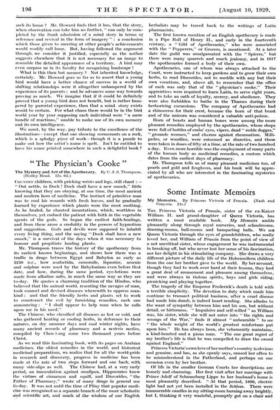"The Physician's Cooke"
The Mystery and Art of the Apothecary. By C. 3.5. Thompson. (Bodley Head. 12s. 6d.) COUNTRY children, with pricking wrists and legs, still chant :— " Out nettle, in Dock ! Dock shall have a new smock," little knowing that they are obeying, at one time, the most ancient and modern laws of medicine. The instinct of primitive man was to cool his wounds with fresh leaves, and he gradually learned by experience which plants were the most soothing. As he healed, he chanted incantations, which, worthless in themselves, yet endued the patient with faith in the vegetable agents of the gods. So began the earliest faith-healings, and from these arose a credulity in the powers of hypnotism and suggestion. Gods and devils were supposed to inhabit every living thing, and the saying "Dock shall have a new smock," is a survival of the days when it was necessary to honour and propitiate healing plants.
Mr. Thompson traces the history of the apothecary from its earliest known beginnings, and shows how there was a traffic in drugs between Egypt and Babylon as early as 2250 B.C., how asafoetida, camomile, liquorice, arsenic and sulphur were used by the Babylonians even before that date, and how, during the same period, eye-lotions were made from alkaline salts, in much the same way as they are to-day. He quotes a charming tradition of the Hindus, who believed that the animal world, resenting the ravages of man, took counsel and devised diseases wherewith to oppress man- kind ; and that the friendly herbs and plants set to work to counteract the evil by furnishing remedies, each one announcing : "I shall appear to help man when he calls upon me in his need."
The Chinese, who classified all diseases as hot or cold, and who gathered heating or cooling herbs, in deference to their natures, on dry summer days and cool winter nights, have many ancient records of pharmacy and a materia medico, compiled by Chen--,_ung some two thousand years before Christ.
As we read this fascinating book, with its pages on Arabian medicines, the oldest remedies in the world, and historical medicinal preparations, we realize that for all the world-pride in research and discovery, progress in medicine has been Made at the rate of two steps forward and one back, with many side-slips as well. The Chinese had, at a very early period, an innoculation against smallpox, Hippocrates knew the virtues of cinnamon and squill, and - Discorides, "the Father of Pharmacy," wrote of many drtigs -in general use to-day. It was not until the time of Pliny thtit po--pair medi- cine was recognized as a separate branch of the more Scholastic
and scientific art, and much of the wisdom of our English , herbalists may be traced back to the writings of Latin pharmacists.
The first known mention of an English apothecary is made in a Pipe Roll of Henry IL, and early in the fourteenth century, a "Gild of Apothecaries," who were associated with the " Pepperers," or Grocers, is mentioned. At a later date the guild was amalgamated with the " Spicers," but there were many quarrels and much jealousy, and in 1617 the apothecaries formed a body of their own.
Apothecaries, one of whom was always attached to the Court, were instructed to keep gardens and to grow their own herbs, to read Diseorides, not to meddle with any but their own vocations, and, above all, to remember that the office of each was only that of the "physician's cooke." Their apprentices were required to learn Latin, to serve eight years, and to take an oath of loyalty, secrecy, and obedience. They were also forbidden to bathe in the Thames during their herborizing excursions. The company of Apothecaries had a rhinoceros for their crest, because the horn of that beast and of the unicorn was considered a valuable anti-poison.
Horn of beasts and human bones were among the more pleasant remedies employed by the apothecaries, whose shops were full of bottles of crabs' eyes, vipers, dead " redde dogges," " grounde wormes," and charms against rheumatism. Milli- pedes, or woodlice, were esteemed as diuretics, and these were taken in doses of fifty at a time, at the rate of two hundred a day. Even more horrible was the employment of many parts of the human body as medicinal remedies, a custom which dates from the earliest days of pharmacy.
Mr. Thompson tells us of many pleasant medicines too, of pearls and gold and foxgloves, and his book will be appre- ciated by all who are interested in the fascinating mysteries of apothecaries.
































 Previous page
Previous page